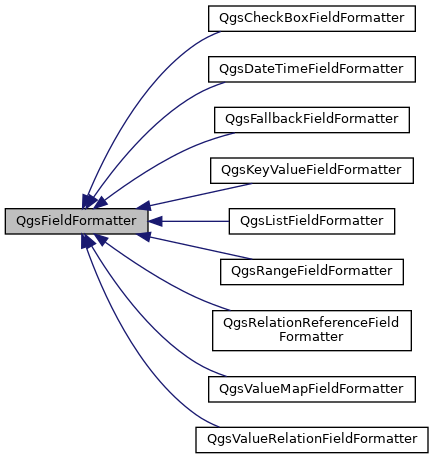A field formatter helps to handle and display values for a field. More...
#include <qgsfieldformatter.h>

Public Types | |
| enum | Flag { CanProvideAvailableValues = 1 } |
| Flags for the abilities of the formatter. More... | |
Public Member Functions | |
| QgsFieldFormatter ()=default | |
| Default constructor. More... | |
| virtual | ~QgsFieldFormatter ()=default |
| virtual Qt::AlignmentFlag | alignmentFlag (QgsVectorLayer *layer, int fieldIndex, const QVariantMap &config) const |
| Returns the alignment for a particular field. More... | |
| virtual QVariantList | availableValues (const QVariantMap &config, int countLimit, const QgsFieldFormatterContext &context) const |
| Returns a list of the values that would be possible to select with this widget type On a RelationReference that would be the parents ids or on ValueMap all the configured keys according to the settings in the config. More... | |
| virtual QVariant | createCache (QgsVectorLayer *layer, int fieldIndex, const QVariantMap &config) const |
| Create a cache for a given field. More... | |
| Flags | flags () const |
| Returns the flags. More... | |
| virtual QString | id () const =0 |
| Returns a unique id for this field formatter. More... | |
| virtual QList< QgsVectorLayerRef > | layerDependencies (const QVariantMap &config) const SIP_SKIP |
| Returns a list of weak layer references to other layers required by this formatter for the given config. More... | |
| virtual QString | representValue (QgsVectorLayer *layer, int fieldIndex, const QVariantMap &config, const QVariant &cache, const QVariant &value) const |
| Create a pretty String representation of the value. More... | |
| void | setFlags (const Flags &flags) |
| Sets the flags. More... | |
| virtual QVariant | sortValue (QgsVectorLayer *layer, int fieldIndex, const QVariantMap &config, const QVariant &cache, const QVariant &value) const |
| If the default sort order should be overwritten for this widget, you can transform the value in here. More... | |
Detailed Description
A field formatter helps to handle and display values for a field.
It allows for using a shared configuration with the editor widgets for representation of attribute values. Field kits normally have one single instance which is managed by the QgsFieldFormatterRegistry. Custom field formatters should be registered there and field formatters for use within code should normally be obtained from there.
This is an abstract base class and will always need to be subclassed.
- Since
- QGIS 3.0
Definition at line 72 of file qgsfieldformatter.h.
Member Enumeration Documentation
◆ Flag
Flags for the abilities of the formatter.
- Since
- QGIS 3.12
| Enumerator | |
|---|---|
| CanProvideAvailableValues | Can provide possible values. |
Definition at line 88 of file qgsfieldformatter.h.
Constructor & Destructor Documentation
◆ QgsFieldFormatter()
|
default |
Default constructor.
◆ ~QgsFieldFormatter()
|
virtualdefault |
Member Function Documentation
◆ alignmentFlag()
|
virtual |
Returns the alignment for a particular field.
By default this will consider the field type but can be overwritten if mapped values are represented.
- Since
- QGIS 3.0
Definition at line 53 of file qgsfieldformatter.cpp.
◆ availableValues()
|
virtual |
Returns a list of the values that would be possible to select with this widget type On a RelationReference that would be the parents ids or on ValueMap all the configured keys according to the settings in the config.
- Since
- QGIS 3.12
Reimplemented in QgsValueRelationFieldFormatter, QgsValueMapFieldFormatter, and QgsRelationReferenceFieldFormatter.
Definition at line 79 of file qgsfieldformatter.cpp.
◆ createCache()
|
virtual |
Create a cache for a given field.
This will be used in situations where a field is being represented various times in a loop. And will be passed to other methods on QgsFieldKit and QgsEditorWidgetWrapper.
For example, the attribute table will create a cache once for each field and then use this cache for representation. The QgsValueRelationFieldFormatter and QgsValueRelationEditorWidget implement this functionality to create a lookuptable once (a QVariantMap / dict) and are make use of a cache if present.
- Since
- QGIS 3.0
Reimplemented in QgsValueRelationFieldFormatter, and QgsRelationReferenceFieldFormatter.
Definition at line 64 of file qgsfieldformatter.cpp.
◆ flags()
|
inline |
◆ id()
|
pure virtual |
Returns a unique id for this field formatter.
This id will later be used to identify this field formatter in the registry with QgsFieldFormatterRegistry::fieldFormatter().
This id matches the id of a QgsEditorWidgetFactory.
Implemented in QgsValueRelationFieldFormatter, QgsValueMapFieldFormatter, QgsRelationReferenceFieldFormatter, QgsRangeFieldFormatter, QgsListFieldFormatter, QgsKeyValueFieldFormatter, QgsFallbackFieldFormatter, QgsDateTimeFieldFormatter, and QgsCheckBoxFieldFormatter.
◆ layerDependencies()
|
virtual |
Returns a list of weak layer references to other layers required by this formatter for the given config.
The default implementation returns an empty list.
This method should be reimplemented by formatters that handle relations with other layers, (e.g. ValueRelation) and can be used by client code to warn the user about missing required dependencies or to add some resolution logic in order to load the missing dependency.
- Note
- not available in Python bindings
- Since
- QGIS 3.12
Reimplemented in QgsRelationReferenceFieldFormatter, and QgsValueRelationFieldFormatter.
Definition at line 73 of file qgsfieldformatter.cpp.
◆ representValue()
|
virtual |
Create a pretty String representation of the value.
- Returns
- By default the string representation of the provided value as implied by the field definition is returned.
- Since
- QGIS 3.0
Reimplemented in QgsValueRelationFieldFormatter, QgsValueMapFieldFormatter, QgsRelationReferenceFieldFormatter, QgsRangeFieldFormatter, QgsListFieldFormatter, QgsKeyValueFieldFormatter, QgsDateTimeFieldFormatter, and QgsCheckBoxFieldFormatter.
Definition at line 24 of file qgsfieldformatter.cpp.
◆ setFlags()
| void QgsFieldFormatter::setFlags | ( | const Flags & | flags | ) |
◆ sortValue()
|
virtual |
If the default sort order should be overwritten for this widget, you can transform the value in here.
- Returns
- an unmodified value by default.
- Since
- QGIS 3.0
Reimplemented in QgsValueRelationFieldFormatter, QgsValueMapFieldFormatter, and QgsRelationReferenceFieldFormatter.
Definition at line 43 of file qgsfieldformatter.cpp.
The documentation for this class was generated from the following files:
- /build/qgis-3.20.0+99unstable/src/core/qgsfieldformatter.h
- /build/qgis-3.20.0+99unstable/src/core/qgsfieldformatter.cpp